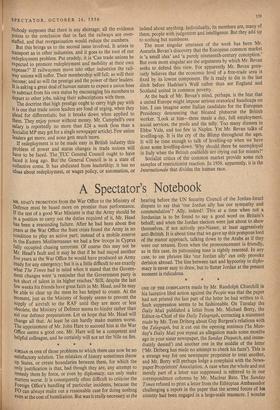But this brings us to the second issue involved. It
arises in transport as in other industries, and it goes to the root of our redeployment problem. Put crudely, it is 'Can trade unions be expected to promote redeployment and mobility at their own expense?' If railwaymen move into other industries the rail- way unions will suffer. Their membership will fall; so will their income; and so will the prestige and the power of their leaders. It is asking a great deal of human nature to expect a union boss M subtract from his own status by encouraging his members to depart to other jobs, taking their subscriptions with them.
The doctrine that high prestige ought to carry high pay with it is one that trade union leaders are fond of urging, when they plead for differentials; but it breaks down when applied to them. They enjoy power without money. Mr. Campbell's own salary is reportedly no more than £24 a week (less than a Socialist MP may get for a single newspaper article). Few union leaders get more; and none gets much more.
If redeployment is to be made easy in British industry this problem of power and status changes in trade unions will have to be faced. The TUC General Council ought to have faced it long ago. But the General Council is in a state of Collective coma. It has abdicated from leadership; it has no ideas about redeployment, or wages policy, or automation, or A Spectator's Notebook MR. HEAD'S PROMOTION from the War Office to the Ministry of Defence must be based more on promise than performance. If the test of a good War Minister is that the Army should be In a position to carry out the duties required of it, Mr. Head has been a resounding failure. After he had been about five Years at the War Office the Suez crisis found the Army in no Condition to play an active part; instead of a mobile.reserve in the Eastern Mediterranean we had a few troops in Cyprus fully occupied chasing terrorists. Of course this may not be Mr. Head's fault and it may be that if he had stayed another five years at the War Office he would have produced an Army ready for any emergency; but it is a little difficult to see exactly what The Times had in mind when it stated that the Govern- ment changes were 'a reminder that the Government party is not short of talent in its higher reaches.' Still, despite the last few weeks his friends have great faith in Mr. Head, and he may be able to clear up the mess he has helped to create. At the moment, just as the Ministry of Supply seems to prevent the supply of aircraft to the RAF until they are more or less obsolete, the Ministry of Defence seems to hinder rather than aid our defence preparations. Let us hope that Mr. Head will change all that. At least he can hardly make matters worse. The appointment of Mr. John Hare to succeed him at the War Office seems a good one. Mr. Hare will be a competent and helpful colleague, and he certainly will not set the Nile on fire.
JORDAN IS ONE of those problems to which there can now be no satisfactory solution. The mistakes of history sometimes throw LIP States, or create boundaries between them, for which the only justification is that, bad though they are, any attempt to remedy them by force, or even by diplomacy, can only make Matters worse. It is consequently often difficult to criticise the Foreign Office's handling of particular incidents, because the FO can always make out a reasonable case for doing nothing even at the cost of humiliation. But was it really necessary at the indeed about anything. Individually, its members are, many of them, people with judgement and intelligence. But they add up to nothing but numbness.
The most singular utterance of the week has been Mr. Aneurin Bevan's discovery that the European common market is 'a small idea' and 'a purely nineteenth-century conception.' But even more singular are the arguments by which Mr. Bevan seeks to defend this view. For apparently Mr. Bevan genu- inely believes that the economic level of a free-trade area is fixed by its lowest component. He is ready to die in the last ditch before Hadrian's Wall rather than see England and Scotland united in common poverty.
At the back of Mr. Bevan's mind, perhaps, is the fear that a united Europe might impose serious oratorical handicaps on him. I can imagine some Italian candidate for the European Presidency denouncing that bloated plutocrat the British worker. 'Look at him—three meals a day, full employment, social services, the pools and the telly. Too many dinners in Ebbw Vale, and too few in Naples. Yet Mr. Bevan talcs of levelling-up. It is the cry of the Blimp throughout the ages. It will be time enough to talk of levelling-up when we have done some levelling-down. Why should there be unemployed in Italy when the British coalfields are crying out for miners?'










































 Previous page
Previous page